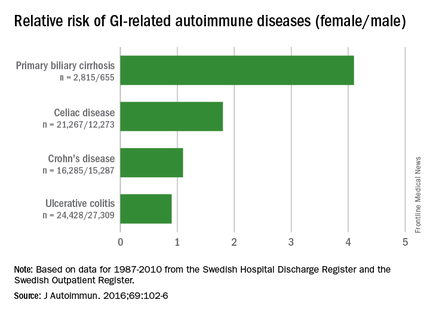Autoimmune diseases are widely thought to be much more prevalent in women, but data from Swedish national registers tell a somewhat different story.
Of the four gastrointestinal conditions among the 32 autoimmune diseases examined, two showed a female predominance, one showed no difference, and one had a male predominance, reported Dr. Jianguang Ji and his associates at Lund (Sweden) University (J Autoimmune. 2016;69:102-6).
Primary biliary cirrhosis had the greater female predominance, with a relative risk for women of 4.1, compared with men, with celiac disease showing a female-to-male ratio of 1.8. There was no difference for Crohn’s disease (RR, 1.1), and ulcerative colitis had a slight male predominance (RR, 0.9), the investigators reported.
The situation was similar for the larger group of conditions: 18 showed a female predominance, 7 had no difference, and 7 showed a male predominance, they noted.
“Most review papers claim that the vast majority of autoimmune diseases have a striking female predominance, and most of them cited that more than 80% of cases affected are women. In this population-based study of 32 specific autoimmune diseases with more than 20 years of follow-up, we found that the incidence in women was only 60% higher as compared to that in men,” Dr. Ji and his associates wrote.
The investigators searched the Swedish Hospital Discharge Register and the Swedish Outpatient Register and found data on 403,757 individuals who had been diagnosed with one or more of the 32 autoimmune diseases between 1987 and 2010. About 62% of the subjects were female.
Dr. Ji and his associates had no conflicts of interest to report. The study was supported by the Swedish Research Council and Region Skåne.


